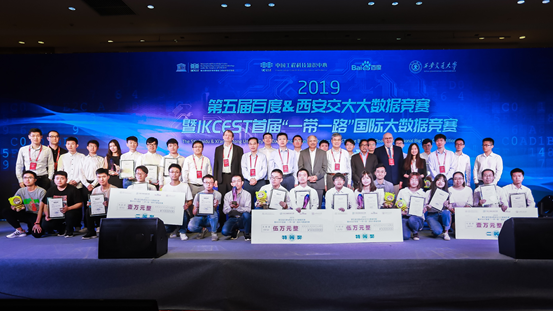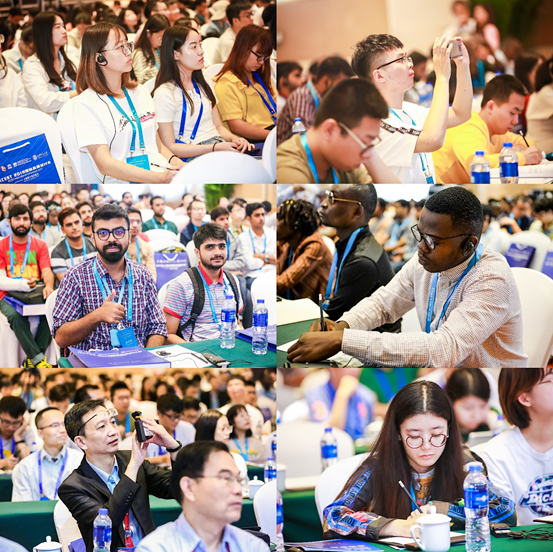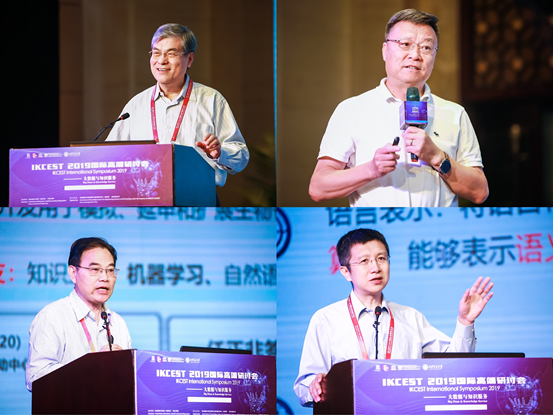
2,300 teams from 16 countries participate in the competition! “The Belt and Road” International Big Data Competition held in Xi'an
In recent years, the status of AI technology has become increasingly important, and countries attach great importance to the training of AI talents. High-level and hyper-competitive international competitions have become the stage for AI talents to show their strength. On September 11, jointly hosted by the International Knowledge Centre for Engineering Sciences and Technology under the Auspices of UNESCO (IKCEST), China Knowledge Centre for Engineering Sciences and Technology (CKCEST), Baidu, Xi'an Jiaotong University, the 1st IKCEST “The Belt and Road” International Big Data Competition and the 5th Baidu Xi'an Jiaotong University Big Data Competition awards ceremony was held in Xi 'an. The “Primula & Orchid” team won the special prize of this competition together with the “Hai Feng Xi Xi” team. Pan Yunhe, Member of the CAS, Raj Reddy, Turing Award winner, Xu Zongben, Member of the CAS, Wang Haifeng, CTO of Baidu and other top academic and industry experts presented prizes and certificates to the winning teams.

As an effective way to cultivate and find excellent AI talents, AI technology competition has attracted more and more attention from all walks of life in recent years. As a leading domestic AI enterprise, Baidu continues to research and develop leading AI technologies, and actively builds an open AI platform. It not only promotes the application of AI technology and the development of intelligent industry, but also pays attention to AI talent training, providing assistance for the growth of young AI talents through competitions, training and other forms.
As an international upgraded version of Baidu Xi'an Jiaotong University Big Data Competition, this competition is open to universities from countries along the "Belt and Road" initiative for the first time. There is a total of 3,226 participants in 2,312 teams from 16 countries. They came from more than 440 universities, including the world's top universities such as Harvard University, Oxford University, Zurich Polytechnic University and Imperial College London. “The competition has demonstrated professional standards in all aspects, from the task setting, to the empowerment of practice and the presentation of works. In particular, the combination of ‘Big data from industry and Big data from the Internet' to classify the functions of urban areas provides a good solution for the construction of 'smart cities' in various countries." Professor Raj Reddy, Chairman of the Competition Advisory Committee, CAE Foreign Member, Turing Award Laureate, expressed his appreciation of the competition at the event.
The Advisory Committee of the competition had excellent personnel allocation, which is rare in similar competitions. In addition to Professor Raj Reddy, the committee includes Pan Yunhe, CAE Member, N. Balakrishna, Fellow of Indian Institute of Science, Otthein Herzog, Member of German Academy of Science and Engineering, Jan Eloff (Professor of the University of Pretoria, the Republic of South Africa, Yang Shengwen, Chairman of Technical Committee of Baidu Big Data Department, etc., forming the strongest and most professional Advisory Committee for an AI competition. In the final defense session, judges commented on the entries on site and exchanged ideas with the finalists, so that young AI talents could gain excellent learning opportunities. After strict and prudent professional evaluation, the "Primula & orchard" team, which was composed of Hu Chao from the University of Chinese Academy of Sciences and Hua Zhixiang from Jiangsu University and the "Hai Feng Xi Xi" team composed of Zhu Qunxi of Fudan University and Zhou Jie of East China Normal University, won the unanimous recognition of the judges for their excellent performance and tied for the first place. The organizers made an exception to increase the number of special awards for the two outstanding teams.

Aiming to tap and train the world's top AI talents, the competition welcomes contestants from every country along the “Belt and Road” initiative, in the hope of achieving a joint effort from "Government + Enterprise + University" to promote the research, application and development of big data industry. With the theme of "urban regional function classification based on satellite remote sensing image and user behavior", the competition innovatively adopted the cross fusion form of "Industrial big data + Internet big data", covering satellite remote sensing images and Internet big data of 70 cities, and required the participating teams to design a city regional function classification model. Baidu, one of the organizers, opened an open source framework for deep learning of Paddle Paddle to help all competitors build and train their data models. At the award ceremony, the first prize winning member of the Homon team, Xue Shu, from the Australian National University, shared his story. He said that as the competition became more and more fierce, it was difficult to support computer calculation. In order to solve the problem quickly, he sold the small car that accompanied him for seven years to buy a server, hoping to find stronger features and better parameters through the server to improve the performance ranking. "I believe all the players have given the same amount of effort and achieved the same amount of results. We are at the cusp of the AI era, full of opportunities and challenges. We will do everything we can to change the world with AI.", he said.

At the event site, an expert group composed of CAE Members such as Pan Yunhe and Gao Wen, CAS Members such as Xu zongben and Wang Haifeng, CTO of Baidu and other top experts also made academic reports and held high-end forums on the topic of "Big data and knowledge services", deeply dissecting the AI development trend and industrialization process under the current situation.

This year marks the 70th anniversary of the founding of new China. In the past 70 years, science and technology have always played the role of "the first productive force" in China's development and construction. At present, AI is gradually becoming a new productivity. It’s particularly important to work out how to cooperate, gather and integrate to build a good ecology conducive to AI talent training and scientific and technological innovation. Baidu, the "head goose" in China's AI field, is working with universities and scientific research institutions to improve the cultivation ecology of AI talents and accumulate talents for the development of China's AI industry.
- Advisers:
-
Chinese Academy of Engineering (CAE)
Ministry of Education College Computer Course Teaching Steering Committee
Silk Road University Alliance
- Sponsors:
-
International Knowledge Centre for Engineering Sciences and Technology under the Auspices of UNESCO (IKCEST)
China Knowledge Centre for Engineering Sciences and Technology (CKCEST)
Baidu
Xi’an Jiaotong University




